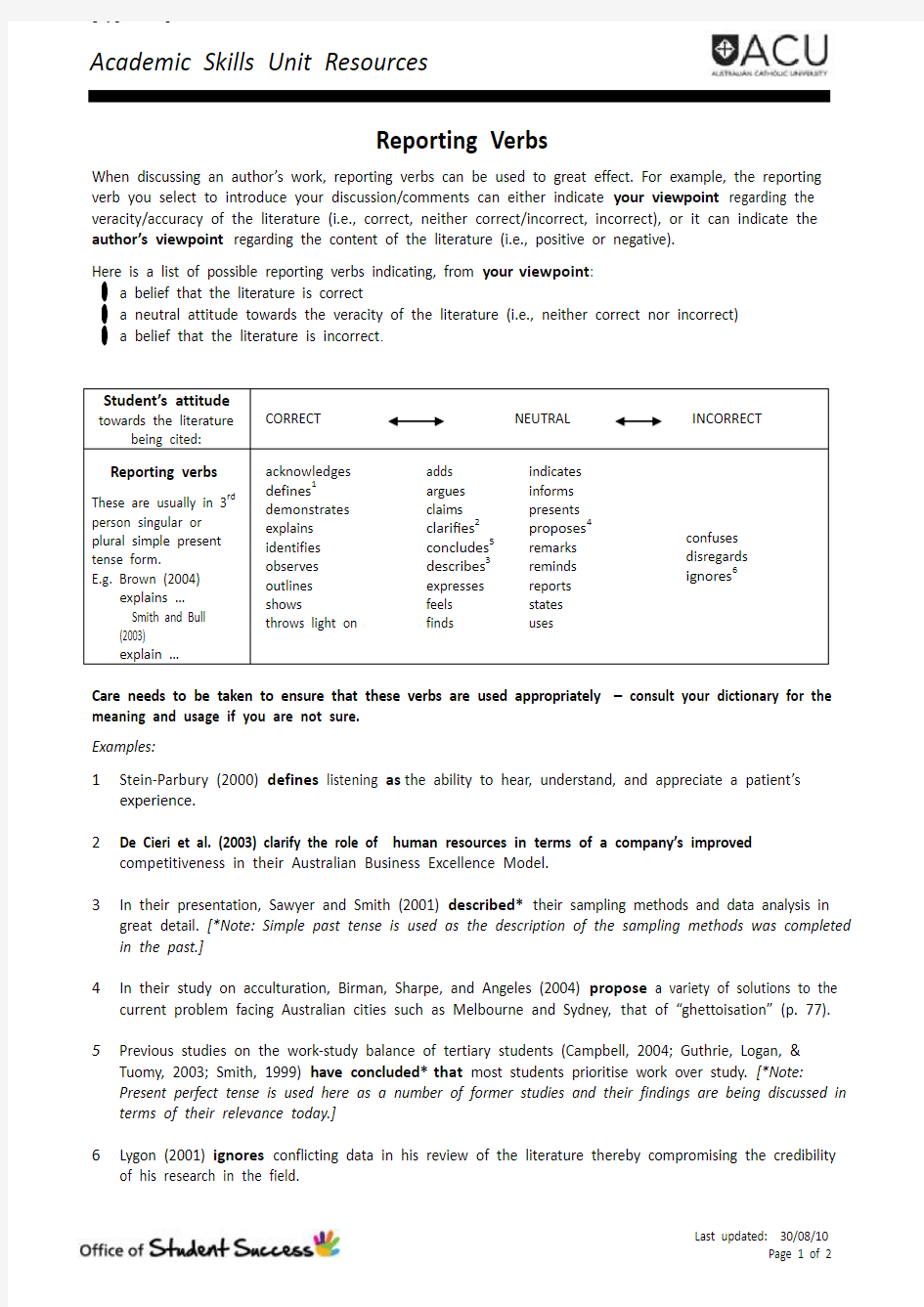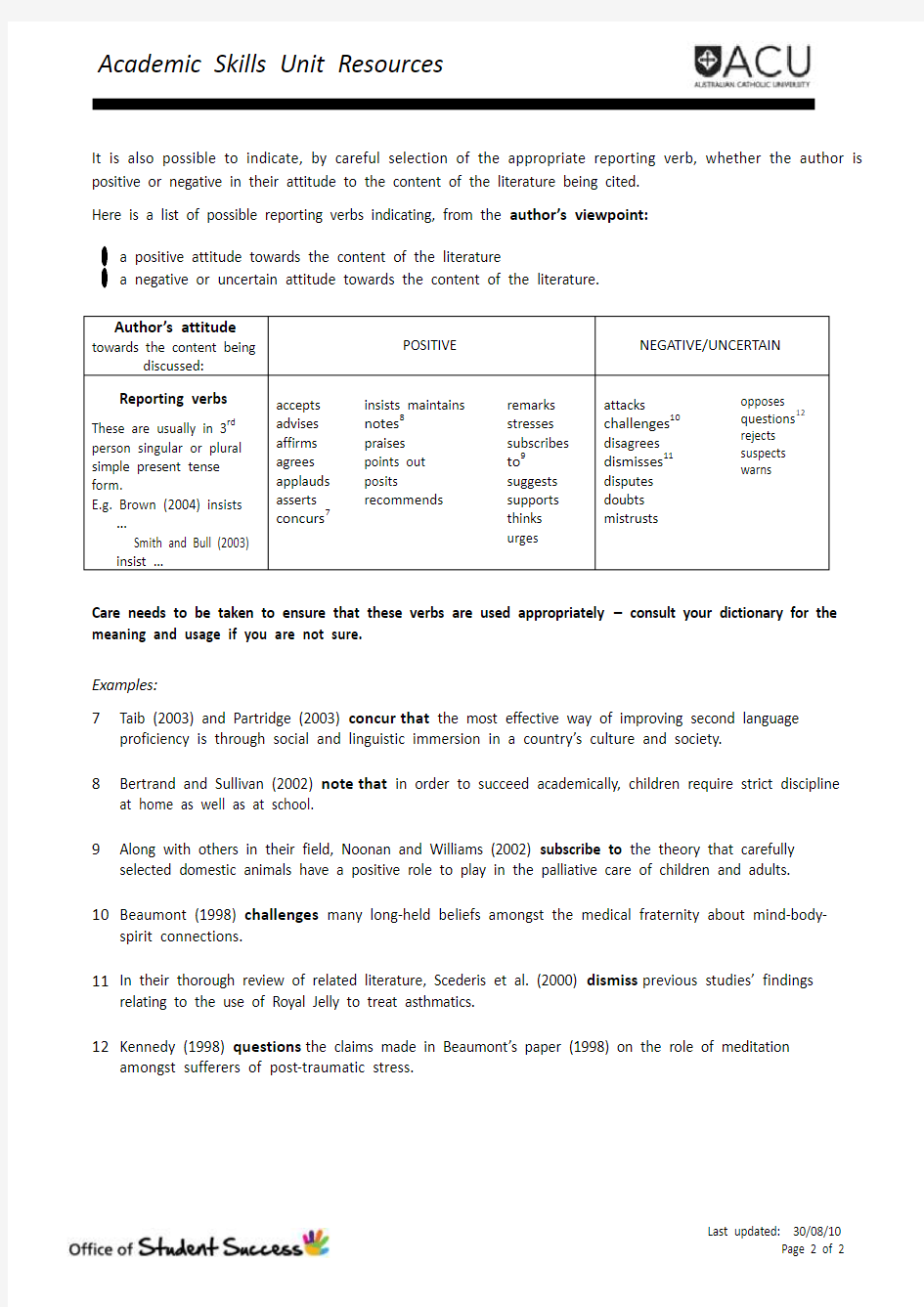Reporting_verbs


Last updated: 30/08/10 Page 1 of 2
Reporting Verbs
When discussing an author’s work, reporting verbs can be used to great effect. For example, the reporting verb you select to introduce your discussion/comments can either indicate your viewpoint regarding the veracity/accuracy of the literature (i.e., correct, neither correct/incorrect, incorrect), or it can indicate the author’s viewpoint regarding the content of the literature (i.e., positive or negative).
Here is a list of possible reporting verbs indicating, from your viewpoint : a belief that the literature is correct
a neutral attitude towards the veracity of the literature (i.e., neither correct nor incorrect) a belief that the literature is incorrect .
Care needs to be taken to ensure that these verbs are used appropriately – consult your dictionary for the meaning and usage if you are not sure. Examples:
1 Stein-Parbury (2000) defines listening as the ability to hear, understand, and appreciate a patient’s
experience.
2 De Cieri et al. (2003) clarify the role of human resources in terms of a company’s improved
competitiveness in their Australian Business Excellence Model.
3 In their presentation, Sawyer and Smith (2001) described* their sampling methods and data analysis in
great detail. [*Note: Simple past tense is used as the description of the sampling methods was completed in the past.]
4 In their study on acculturation, Birman, Sharpe, and Angeles (2004) propose a variety of solutions to the
current problem facing Australian cities such as Melbourne and Sydney, that of “ghettoisation” (p. 77).
5 Previous studies on the work-study balance of tertiary students (Campbell, 2004; Guthrie, Logan, &
Tuomy, 2003; Smith, 1999) have concluded* that most students prioritise work over study. [*Note: Present perfect tense is used here as a number of former studies and their findings are being discussed in terms of their relevance today.]
6 Lygon (2001) ignores conflicting data in his review of the literature thereby compromising the credibility
of his research in the field.
Last updated: 30/08/10
Page 2 of 2
Academic Skills Unit Resources
It is also possible to indicate, by careful selection of the appropriate reporting verb, whether the author is positive or negative in their attitude to the content of the literature being cited. Here is a list of possible reporting verbs indicating, from the author’s viewpoint:
a positive attitude towards the content of the literature
a negative or uncertain attitude towards the content of the literature.
meaning and usage if you are not sure.
Examples:
7 Taib (2003) and Partridge (2003) concur that the most effective way of improving second language
proficiency is through social and linguistic immersion in a country’s culture and society.
8 Bertrand and Sullivan (2002) note that in order to succeed academically, children require strict discipline
at home as well as at school.
9 Along with others in their field, Noonan and Williams (2002) subscribe to the theory that carefully
selected domestic animals have a positive role to play in the palliative care of children and adults.
10 Beaumont (1998) challenges many long-held beliefs amongst the medical fraternity about mind-body-spirit connections.
11 In their thorough review of related literature, Scederis et al. (2000) dismiss previous studies’ findings
relating to the use of Royal Jelly to treat asthmatics.
12 Kennedy (1998) questions the claims made in Beaumont’s paper (1998) on the role of meditation
amongst sufferers of post-traumatic stress.
